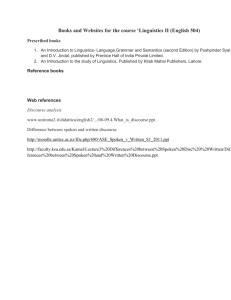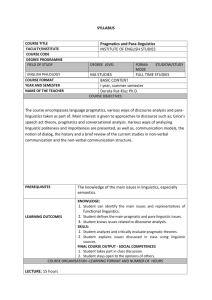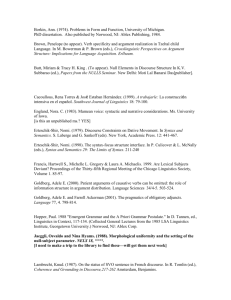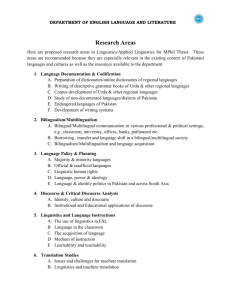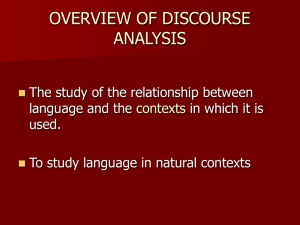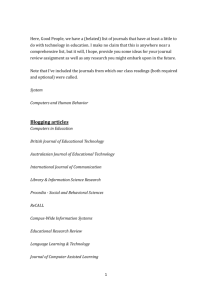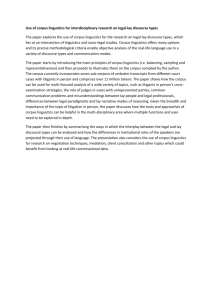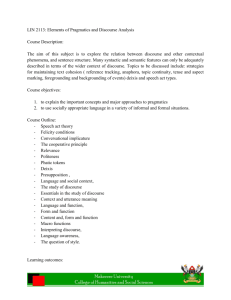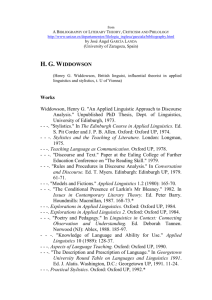MODULE DESCRIPTOR
advertisement
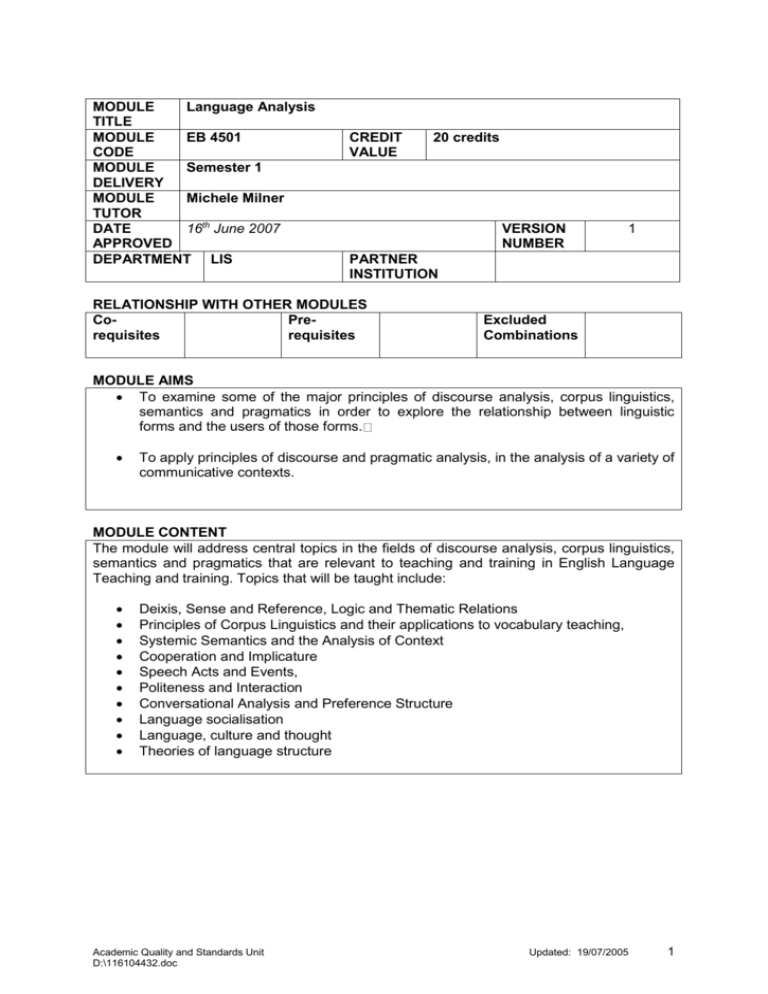
MODULE Language Analysis TITLE MODULE EB 4501 CODE MODULE Semester 1 DELIVERY MODULE Michele Milner TUTOR DATE 16th June 2007 APPROVED DEPARTMENT LIS CREDIT VALUE 20 credits VERSION NUMBER 1 PARTNER INSTITUTION RELATIONSHIP WITH OTHER MODULES CoPrerequisites requisites Excluded Combinations MODULE AIMS To examine some of the major principles of discourse analysis, corpus linguistics, semantics and pragmatics in order to explore the relationship between linguistic forms and the users of those forms. To apply principles of discourse and pragmatic analysis, in the analysis of a variety of communicative contexts. MODULE CONTENT The module will address central topics in the fields of discourse analysis, corpus linguistics, semantics and pragmatics that are relevant to teaching and training in English Language Teaching and training. Topics that will be taught include: Deixis, Sense and Reference, Logic and Thematic Relations Principles of Corpus Linguistics and their applications to vocabulary teaching, Systemic Semantics and the Analysis of Context Cooperation and Implicature Speech Acts and Events, Politeness and Interaction Conversational Analysis and Preference Structure Language socialisation Language, culture and thought Theories of language structure Academic Quality and Standards Unit D:\116104432.doc Updated: 19/07/2005 1 LEARNING OUTCOMES On successful completion of this module a student will be able to: 1. Apply the relevant principles in discourse and pragmatics in the analyses of various communicative and pedagogical contexts. 2. Employ, as part of research training, a variety of corpus linguistic techniques to study ‘real’ communicative encounters. 3. Demonstrate how the interactional practices of various professional communities differ and are similar to language interaction in the classroom. 4. Critically evaluate current research in the field of language analysis and develop critiques of them in terms of their relevance to the field of Professional Communication. TEACHING AND LEARNING STRATEGY This seminar-based postgraduate module is designed so as to encourage autonomous and self-directed learning within the framework of a closely structured environment. Students will be encouraged to fulfil the learning outcomes of the course through judicious use of tutor guidance, peer discussion and supplementary learning materials. In addition, they will be encouraged to participate through independent research and to demonstrate critical and analytical thinking and problem solving skills. INDICATIVE ASSESSMENT Number of Assessment Assignments Weighting % 1 Essay 1 Practical task 50% Type/Duration/ Wordcount (indicative only) 2000 words Learning Outcomes being assessed 1,2, 3 50% 2000 words 4, 5. MODULE PASS REQUIREMENTS Students must score an overall mark of 40% to successfully complete this module. BIBLIOGRAPHY AND LEARNING SUPPORT MATERIAL Candlin, Christopher (ed.) (2002) Research and Practice in Professional Discourse. Hong Kong: City University of Hong Kong. Carter, R., A. Goddard, D. Reah, & K. Sanger (2001) Working with Texts: A Core book for Language Analysis. London: Routledge * Cazden, C. B. (2001) Classroom Discourse: The Language of Teaching and Learning, London: Greenwood Press Christie, F. (2002) Classroom Discourse Analysis: A Functional Perspective (Open Linguistics) London: Continuum * Connor, U., & Upton, T.A. (Eds.) (2004). Discourse in the Professions: Perspectives from Corpus Linguistics. Amsterdam/Philadelphia: John Benjamins Publishing Co. Cutting, J. (2002). Pragmatics and Discourse: A Resource Book for Students London: Routledge * Academic Quality and Standards Unit D:\116104432.doc Updated: 19/07/2005 2 Fairclough, N. (2001) Language and Power (2nd Rev edition) Harlow: Longman Fairclough, N. (2003) Analysing Discourse: Textual Analysis for Social Research Harlow: Longman Grundy, P. (2000) Doing Pragmatics Oxford: Hodder Arnold Hughes, R. (2005) Spoken English, Applied Linguistics and Tesol: Challenges for Theory and Practice Basingstoke: Palgrave Macmillan * Meyer, C. F. (2002). English Corpus Linguistics: An Introduction. Cambridge: Cambridge University Press Meyer, M. (2002). Method of Text and Discourse Analysis London: Sage Schriffin, D., D. Tannen, D. Hamilton. & H. Ehernberger (Eds.)(2003). A Handbook on Discourse Analysis London: Blackwell * Schmitt, N. (2003) An Introduction to Applied Linguistics: Oxford: Hodder Arnold Sinclair, J. (2004) How to use Corpus Linguistics in Language Teaching Amsterdam: John Benjamins Willis, D. (2003) Rules, Patterns and Words: Grammar and Lexis in Language Teaching Cambridge: Cambridge University Press Wray, A. & A. Bloomer (2006) Projects in Linguistics Oxford: Hodder Arnold Wooftitt, R. (2005) Conversation Analysis and Discourse Analysis: A Comparative and Critical Introduction London: Sage Yule, G. (2005) Pragmatics Oxford: Oxford University Press * Core texts Academic Quality and Standards Unit D:\116104432.doc Updated: 19/07/2005 3
